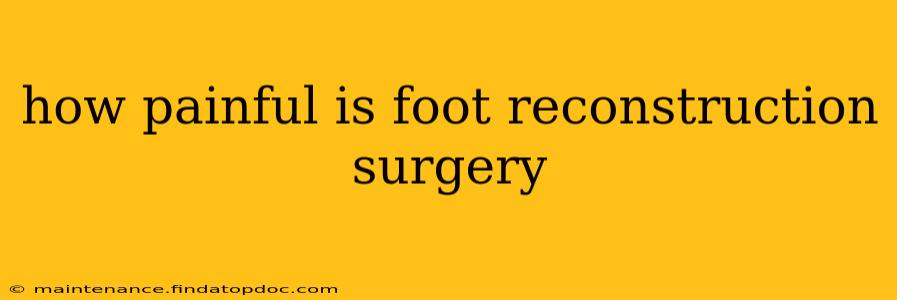Foot reconstruction surgery encompasses a wide range of procedures, addressing everything from bunions and hammertoes to more complex issues like Charcot foot or severe trauma. Therefore, the level of pain experienced post-surgery varies significantly depending on the specific procedure, the extent of the surgery, the individual's pain tolerance, and the surgeon's technique. This guide explores the pain associated with foot reconstruction surgery, providing insights into what to expect before, during, and after the procedure.
What to Expect Before Surgery:
Pre-operative pain management is crucial. Your surgeon will discuss your pain history and create a plan that might include medication to reduce anxiety and pain. Open communication with your surgical team is vital. Express any concerns about pain management to ensure your comfort is prioritized throughout the process.
During Surgery:
During the surgery itself, you will be under anesthesia, so you won't feel any pain. The type of anesthesia (local, regional, or general) will depend on the complexity of the procedure and your individual needs.
Post-Operative Pain:
This is where the level of pain varies greatly. Immediately after surgery, you will likely experience pain, although the intensity varies depending on the procedure. Your surgical team will prescribe pain medication, often a combination of stronger painkillers and anti-inflammatory drugs. This medication is essential for managing pain and reducing swelling.
How Long Does the Pain Last?
The duration of post-operative pain is also variable. Simple procedures, like bunion removal, may result in pain lasting for several weeks, gradually improving with time and physical therapy. More complex surgeries, especially those involving extensive bone work or nerve repair, may result in pain lasting for several months. The recovery process is often gradual, with some lingering discomfort potentially persisting for longer.
What Type of Pain Can I Expect?
The type of pain can range from sharp, throbbing pain to a dull ache. You may also experience stiffness, swelling, and sensitivity to touch. The location and intensity of the pain will depend on the specifics of your surgery.
What Pain Management Techniques are Used?
Beyond medication, your post-operative care may include:
- Ice Packs: These help to reduce swelling and pain.
- Elevation: Keeping your foot elevated helps to reduce swelling.
- Physical Therapy: A tailored physical therapy plan is vital for regaining strength, mobility, and reducing pain.
- Pain Medication Management: Your doctor will work with you to find the right balance of pain medication, minimizing side effects while effectively managing your pain.
What Factors Influence Post-Operative Pain?
Several factors influence the level and duration of post-operative pain:
- Type of Surgery: Complex procedures naturally lead to more pain and longer recovery.
- Individual Pain Tolerance: People react differently to pain.
- Pre-existing Conditions: Underlying health conditions can influence pain management and recovery.
- Adherence to Post-Operative Instructions: Following your surgeon's instructions closely aids in faster recovery and reduces pain.
Are There Alternatives to Foot Reconstruction Surgery?
In some cases, non-surgical options, such as medication, physical therapy, orthotics, or injections, may alleviate symptoms without the need for surgery. Your surgeon will discuss all available options with you.
When to Contact Your Doctor:
Contact your doctor immediately if you experience:
- Severe or increasing pain that isn't managed by medication.
- Signs of infection, such as redness, swelling, or pus.
- Numbness or tingling in your foot or toes.
- Changes in your foot's appearance.
Foot reconstruction surgery can significantly improve mobility and quality of life, but it's essential to be prepared for post-operative pain. Open communication with your surgical team, meticulous adherence to their instructions, and a proactive approach to pain management are crucial for a successful recovery. Remember, this information is for general knowledge and should not substitute professional medical advice. Always consult your surgeon for personalized guidance.
